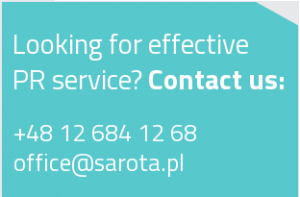Choosing a PR agency for handling company or brand communication involves formulating the requirements which it should meet. Specifying the selection criteria will facilitate the selection process. I will present three arguments for cooperating with a specialized agency, while making it clear that I am writing from a perspective of a person who manages such an agency.
“Full service” or narrower specialization?
One of the frequent dilemmas faced by a person responsible for choosing a PR agency is deciding between two options: a “full service” agency or an agency specializing in a particular industry. This choice if often not an obvious one. A “full service” agency is usually a greater entity – it may be compared to a supermarket which is able to meet universal needs of most customers. A specialized agency, on the other hand, will build its competitive advantage by offering a narrow range of products targeted at a particular customer group. This is especially important if the client’s business has specific characteristics which require the knowledge of technology, products or legislative restrictions. Such industries include broadly defined IT, healthcare and the financial industry.
Better knowledge of the industry and the target group
When deciding to cooperate with a specialized public relations agency, the client may be assured right from the start that the agency’s team will understand its business context. This includes market environment, competition and the specifics of operations. Functioning in one area brings the agency closer to final recipients of communication. This often results from the fact that the agency’s consultants are enthusiasts of the topics on which they work or have experience in interacting with those groups. For example, a games enthusiast will be able to identify the needs of the target group of a producer of computer parts or a games publisher much more precisely. In this way, the agency is able to fully understand the communication targets presented to it, the cooperation starts much more quickly and the activities offered by the agency are more likely to be appropriate and bring better and quicker results.
A preferred partner for the media
The agency’s specialization also translates into the quality and breadth of media contacts. The core of PR activities – apart from very good press materials – consists in established, trust-based relations with journalists, bloggers, influencers and industry experts. Building such relations takes time, and their basis is the history of cooperation as a result of which the agency knows the journalist’s expectations and preferences, and the journalist approaches the topics and materials offered by the specialized agency more openly. Consultants from a specialized agency are well-oriented partners in a conversation with a media representative. Moreover, an agency focused on a particular industry usually has a broader and more up-to-date contact base. Consultants work with industry media on a daily basis, so they follow all HR changes, go to industry events and systematically establish new relations. They do not have to spend time on building a contact base ad-hoc and each time try to reach the right persons whom they have never contacted before.
An agency which provides services to companies from a particular industry and works for many of its representatives (which do not, however, directly compete with each other) is a preferred partner for the media. It directly results from two factors.
Firstly, journalists are more willing to use the materials from an agency which they know and which they contact more frequently. They have higher trust in the quality of the received materials. In the situation when journalists are forced to select information and receive more materials than they are able to use, such approach is fully understandable and logical.
Secondly, a journalist can be sure than when necessary, they will receive quick support from an agency with which they have cooperated before and which they know to handle the topic in question. That is why specialized agencies more often receive questions from journalists and may deliver statements, materials or products of their clients. Such agencies are also aware of opportunities of client placement in the media.
The fact that materials which are proactively delivered to the media by a specialized agency are used more often, and that such agency is able to react to journalists’ demand, directly translates into the number of publications about the client.
Synergy of knowledge and continuous improvement
An agency which has chosen its specialization consequently builds a team around it and cares about each member’s development. It focuses on the selected field, which creates an atmosphere that facilitates knowledge exchange within the team and is conducive to mutual inspiration. This takes place on both formal and informal level: team members may jointly develop ideas and assess texts; and informal conversations in the kitchen, or even jokes often revolve around industry topics. In the presence of like-minded persons, employees gain the necessary skills and knowledge much more effectively.
The aspect of cumulating experience is also important with regard to experience transfer from one client to another. By observing and participating in many projects in the same industry, one may predict the consequences of planned actions, minimize the risk of ill-judged ideas, or repeat the sequence of steps leading to success. This increases the team’s creative and executive power. Industry expertise also enables the agency to decide on the implementation of non-standard and risky projects in a more conscious way.
Compare the comparable
Realizing the impact of the choice of the right PR agency on increasing brand recognition and building its reputation, each company will try to make this decision as carefully as possible and to the best knowledge of persons involved in that process. When organizing the tendering procedure, clients should know to which agencies they want to send requests for proposals. If they want to check the possibilities offered by both “full service” and specialized agencies, they must remember that direct comparison of the team’s size and company revenue, or being guided by the agency’s recognizability, may lead to incorrect conclusions. However, such comparison makes sense when we look at several specialized agencies. Additionally, apart from comparing rates and settlement methods, clients should pay attention to the agency’s previous successes, prizes in industry competitions, and effects of conducted activities. The company’s organizational culture and stability of a team of specialists also play a vital role here.
Follow us on LinkedIn.



